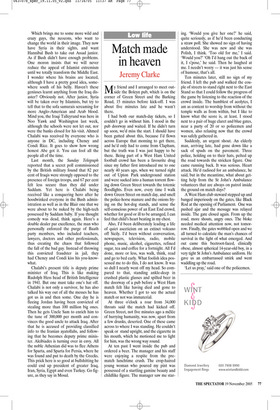Match made in heaven
Jeremy Clarke
My friend and I arranged to meet outside the Boleyn pub, which is on the corner of Green Street and the Barking Road, 15 minutes before kick-off. I was about five minutes late and he wasn’t there.
I had both our match-day tickets, so I couldn’t go in without him. I stood in the pub doorway and waited. If he didn’t turn up soon, we’d miss the start. I should have been gutted about this, because I’d flown across Europe that morning to get there, and he’d only had to come from Clapham, but the truth was I was just happy to be there. Being part of a West Ham United football crowd has been a favourite drug since my father first introduced me to one nearly 40 years ago, when we turned right out of Upton Park underground station and were sucked into a human torrent flowing down Green Street towards the totemic floodlights. Even now, every time I walk down Green Street on match day, and smell the police-horse manure and the onions frying on the hot-dog stands, and sense the self-conscious power of an East End crowd, whether for good or ill to be arranged, I can feel that child’s heart beating in my chest.
Also, I’d been deliberately leading a life of quiet asceticism on an extinct volcano off Sicily. I’d been without conversation, newspapers, television, radio, mobile phone, music, alcohol, cigarettes, refined sugar, tea and coffee for a fortnight. All I’d done, more or less, was walk, think, read and go to bed early. What foolish idea possessed me to do this, I do not know. It was so dull I nearly went off my head. So compared to that, standing ankle-deep in crushed plastic glasses and spilled beer in the doorway of a pub before a West Ham match felt like having died and gone to heaven. Whether I got to see the actual match or not was immaterial.
At three o’clock a roar from 34,000 throats said the match had kicked off. Green Street, not five minutes ago a mêlée of hurrying humanity, was now, apart from a few drunks, deserted. One of these came across to where I was standing. He couldn’t speak or stand upright, and the cigarette in his mouth, which he motioned me to light for him, was the wrong way round.
At ten past I went inside the pub and ordered a beer. The manager and his staff were enjoying a respite from the prematch lunchtime crush. The crop-haired young woman who poured my pint was possessed of a startling gamine beauty and childlike figure. The manager saw me star ing. ‘Would you give her one?’ he said, quite seriously, as if he’d been conducting a straw poll. She showed no sign of having understood. She was new and she was Polish, I think. ‘Too old for me,’ I said. ‘Would you?’ ‘Oh I’d hang out the back of it, I s’pose,’ he said. Then he laughed at me. I needn’t worry — it was just his sense of humour, that’s all.
Ten minutes later, still no sign of my friend. I left the pub and walked the couple of streets to stand right next to the East Stand so that I could follow the progress of the game by listening to the reaction of the crowd inside. The humblest of acolytes, I am as content to worship from without the temple walls as from within, but I like to know what the score is, at least. I stood next to a pair of huge claret and blue gates, near a party of 20 or so policemen and women, also relaxing now that the crowd was safely gathered in.
Suddenly, an urgent shout. An elderly man, arriving late, had gone down like a sack of spuds on the pavement. Three police, holding on to their hats, pelted up the road towards the stricken figure. One came running back. It was serious. Heart attack. He’d radioed for an ambulance, he said, but in the meantime, what about getting help from the St John’s Ambulance volunteers that are always on patrol inside the ground on match days?
A West Ham club steward stepped up and banged imperiously on the gates, like Black Rod at the opening of Parliament. One was pushed ajar and the message was relayed inside. The gate closed again. From up the road, more shouts, angry ones. The bloke needed medical attention now, not tomorrow. Finally, the gates wobbled open and we all turned to calculate the man’s chances of survival in the light of what emerged. And out came this beetroot-faced, clinically obese, almost spherical 14-year-old boy, in a very tight St John’s Ambulance uniform. He gave us an embarrassed smirk and went waddling up the road.
‘Let us pray,’ said one of the policemen.

























































 Previous page
Previous page